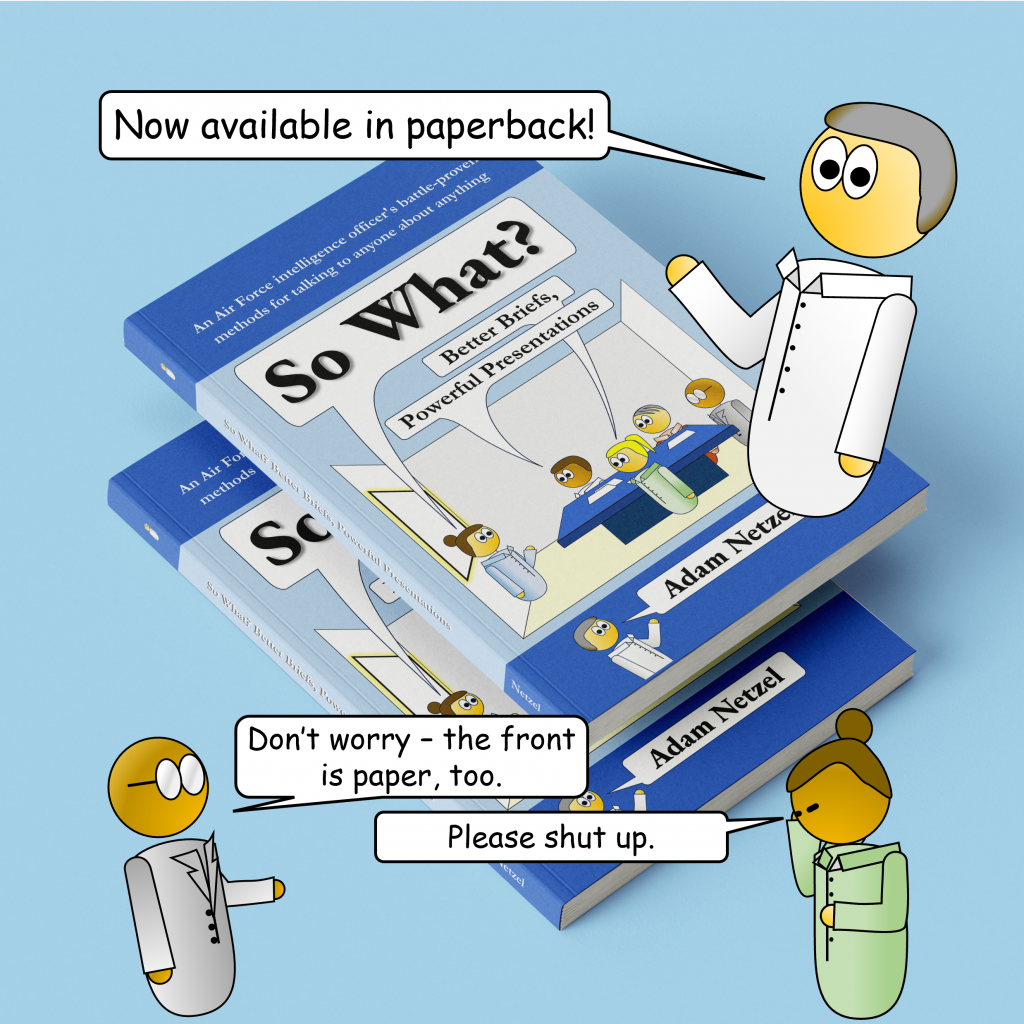Public speaking is generally categorized as informative, demonstrative, and persuasive, depending on what you read. However, I would argue that all speaking is persuasive to some degree, because even if you’re not pitching something directly, you’re still persuading people that what you have to say is worth hearing. That said, for this post, we’ll stick with the strict definition of persuasive speaking – that of convincing the audience to adopt a particular point of view.
When it comes to briefing in the military, the most common question is, “So what?” When briefing a commander, it’s not enough just to tell him, “Hey sir, the enemy moved five clicks north.” To answer that ” So what,” the analyst had better be prepared with an answer like, “That means they’ll reach our position by morning, and we’re vulnerable on our southern front.” The strategy holds true when pitching a new initiative or selling a product. As the old sales adage goes, “Don’t sell the steak, sell the sizzle.” When trying to persuade an audience, you have to package your message in terms that they meaningfully understand. How do we do that?
Crafting a Pitch
In Chris Voss’s excellent book “Never Split the Difference: Negotiating As If Your Life Depended On It,” he provides guidance on active listening, empathy, and how to approach negotiations, which is ultimately what persuasion is: negotiating a convincing approach in exchange for someone else’s acceptance of the idea. One great tool he teaches is the power of “no.” Despite the conventional “get to yes” approach, people feel a far greater sense of security and power when saying no, and it can get you a lot further in selling something than trying to use soft yeses to seed a sale closure.
Say you’re a bank teller, and you get a commission for every customer who signs up for a particular investment opportunity. Only certain customers will qualify based on their financial state, and the more that sign up, the bigger the commission. The challenge is that anyone with attractive financials is already getting plenty of opportunities thrown at them, so they’re naturally going to resist anything that sounds like the bank is after their money. How do you cut through the noise and stand out as an opportunity worth investigating? By appealing to what they actually care about.
For example, you know the customer has decent numbers, so if you’re comfortable with it and personable enough, open with something like, “Wow – you’ve done well for yourself. Not the type to throw away money, are you?” Of course they’ll likely say no, involving Chris Voss’s strategy, making them feel like they are in a position of power. At that point you pause for a second, then say, “You know, I’m only authorized to do this for certain customers, but would it be impossible to set you up with someone who can talk more about securing your financial future?” This implies a sense of exclusivity, and by saying “would it be impossible,” they either have to say no again, because nothing is truly impossible, and you can start the scheduling, but if they say yes, you can ask, “How do you think we can make it possible?”
At no point did you say “Would you like to buy something?” or “Do you want to hear about an investment opportunity?” The customer is already doing well financially, so it’s a fair bet they are already familiar with various financial instruments. Instead, you’re appealing to the customer’s sense of preservation and loss aversion. Securing one’s financial future and avoiding loss are powerful motivators. The key is to avoid any kind of trigger where it comes across that you are trying to take from someone. For a persuasive speaker, that means finding a way to empower the audience mentally, and more importantly, selling them on something they truly care about.
Let’s take this out of a high pressure situation like sales. Say you’re trying to convince your boss of a new initiative, but it’s untried, and you have no comparable success stories to reference. Although it’s a bit crude, I remind my students that someone had to sell the first enema. The key is not selling the direct effects, but selling the consequences of those effects. Perfume commercials don’t pitch audiences on how good they’ll smell. They invoke images that give you the idea you’ll smell so good, your entire life will be elevated in ways you couldn’t possibly imagine. Sports companies are masters of this. Whether we’re talking about apparel, sports drinks, or athletic shoes, you almost never see them sell based on quality, endurance, or comfort. Instead the commercials depict athletes winning races and claiming trophies. The product will not make you win, they say, but it could help. What does this look like, say, in a business setting?
Keys to Persuasion
At the end of the day, persuasion comes down to articulating benefits and how you frame those benefits. Articulating benefits typically comes down to one of the 3 M’s: money, minutes, and me. In other words, can I do something cheaper, can I do something faster, or does the presenter’s information benefit me or something that I care about? Framing the benefit is about understanding or action. Meaning, at the end of the presentation, can your audience make sense of something they couldn’t before, or can they perform a task they couldn’t before? To make it persuasive, you must answer the question: what does that understanding or skill let them do?
So with the initiative for your boss, suppose it is introducing a new initiative or project, but the approach is unproven. Project pitches don’t always fail for lack of data or articulation – they fail for lack of comprehension. Your boss might understand the components of the pitch individually, and she might even be able to repeat back to you what you’re planning, but that doesn’t mean she understands why you’re asking it. Even if she does, maybe she doesn’t care because she doesn’t perceive any benefit the way you do. I regularly remind my analysts that what is obvious to them is not always obvious to others. Some people see a mathematical concept once and immediately understand it – others wish the entire field didn’t exist. This is one of the greatest mistakes many speakers make: you cannot assume that your lived experience is the same as others. Whether it is genetics, upbringing, environment, education, or any other of a million factors, the countless variables that brought you to where you are in life differ vastly from those influencing the lives of others.
When I talk about the 3 M’s, I mean your audience’s 3M’s – not yours. Maybe you value the project because, once complete, it will save time for your team and make their work more efficient, but your boss is content with your current level of productivity and sees the cost of the project as an outlay of resources with no discernible return. That means you need one of the other two M’s, which means, like all public speaking, you need to know your audience. Is your boss strictly about the bottom line? Then tie enhanced productivity to profits or departmental savings. Is she a climber? Figure out how to spin the project as a feather in her cap that will get her noticed by her superiors. Some people see this as unseemly or even dishonest. I hear arguments like “But it’s not about profits – it’s about productivity.” I counter with “It’s not about profits to you. That’s all it’s about to her.” Usually that’s met with an objection that bosses are cold hearted and only think about the bottom line, which – ok, so what? If you can frame it so that your boss sees benefits in a way that’s meaningful to her while also getting what benefits your team, where is the problem? Both can be true – it’s about shifting your lens to someone else’s perspective.
At the end of the day, public speaking is about relationships. When trying to persuade an audience, your goal is not to be as convincing as possible – it’s to be as relatable as possible. Make the audience your friend by being their friend. Why do people dislike car salesmen? Almost everyone needs a car, everyone needs to make a living, and there must be a point of purchase for cars, so what makes the process so stressful and distasteful? People don’t dislike car salesmen because they’re trying to make money – people dislike car salesman because they’re trying to make money at your expense. The salesman is not trying to get you in the car that best fits your need as far below your budget as possible; he’s trying to get you in the most expensive car you can afford with the highest commission. That is not a positive relationship, and there is a whole industry built around it. Compare that to, say, an academic advisor in college. You are paying tuition either way, and there is no incentive for the advisor to push you toward one major or another, though they certainly have an opinion based on their experience. Accordingly, their strategy will generally be much more relational, to get to know you, to understand your motivations and interest, then frame an academic path in a way that is meaningful to you. The same is true for an audience. You will not be able to personally know every audience member every time you speak, but you can learn about them and shape your persuasion accordingly.

